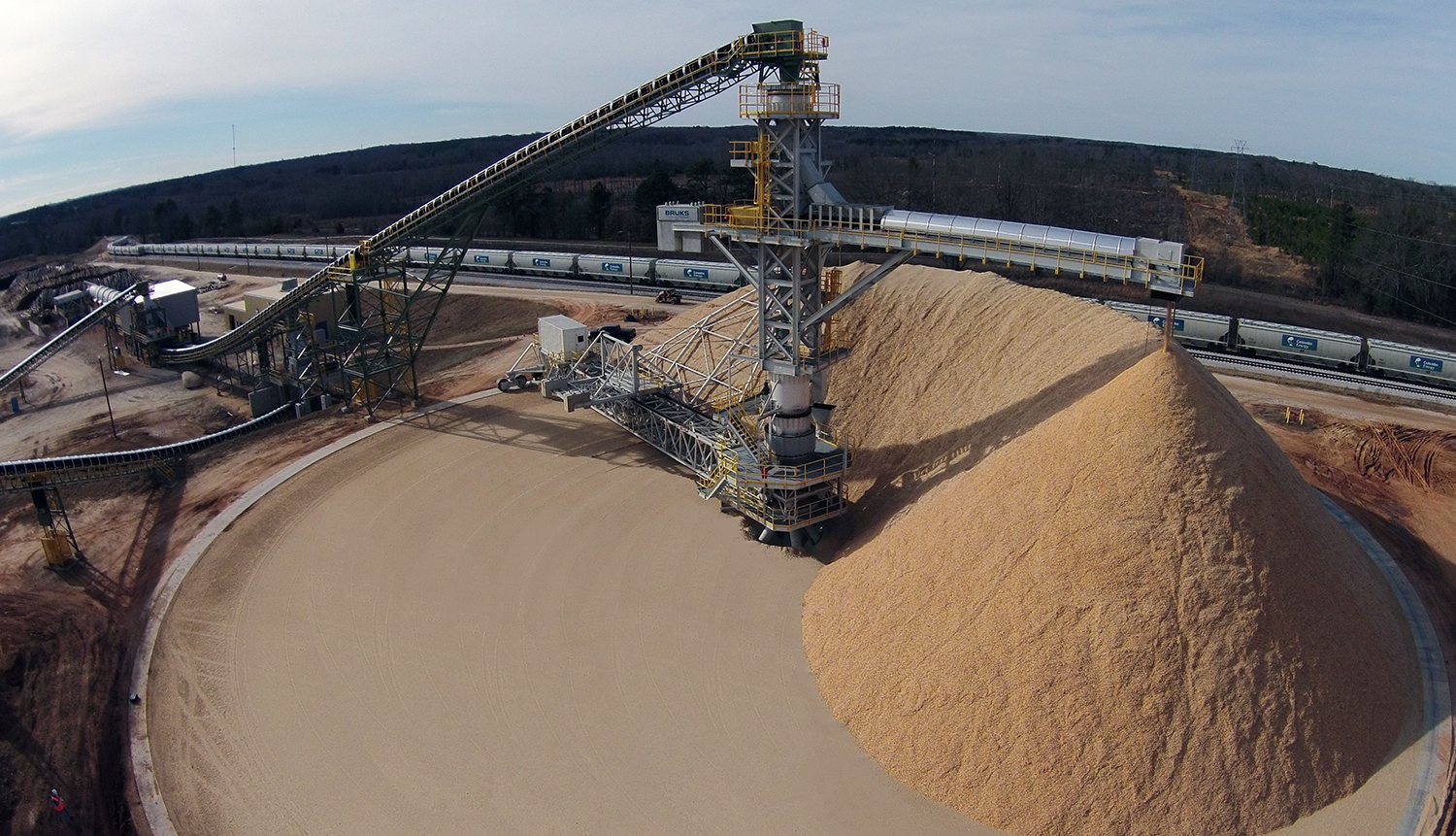Sustainable, commercial advantages: A pioneering wood handling and processing portfolio
From prehistoric to modern times, wood has been an essential part of civilizations; valued for its versatility for millennia. With the world covered by about 4,000 million hectares of forest; about a third of its total area, wood is a significant bulk material. Bruks Siwertell has been specializing in wood handling and wood processing for over a century.
We supply complete technology chains for many wood handling and wood processing industries. From the forest to the sawmill, and beyond into the pulp and paper, panelboard, pellet, biofuel and bioenergy industries, our technology is relied upon throughout the world across hundreds of installations.
Our strong portfolio of Bruks and WSM wood handling and wood processing technology for the biofiber market includes industrial wood chippers, shredders, hogs, grinding and milling machinery, screening systems and conveyors, as well as butt-flare reducers and no-knife resizers, knife-ring flakers, bark, compost, mulch and urban waste wood processing, and storage and reclaiming solutions. Whatever fiber conversion technology, wood handling and wood processing system your operation needs, we have the industry knowledge and expertise to maximize the potential from your raw materials.
An environmental lifeline
Wood is one of the only construction materials that has the ability to store carbon, and interest in it as a thermal power fuel has increased globally as generators look to switch to renewable energy sources. Wood can be used in boilers as wood chips or biomass pellets, making particularly good use of waste wood residues.
Sustainability is critical; for wood to be a renewable resource it must be sourced from well-managed forestry stock. We work with stakeholders that pride themselves on delivering and driving environmental sustainability within the processed wood sector.
Sawmills: producing more than just straight cuts
Modern sawmills have diversified. They now not only cut with digital accuracy, but also make even better use of the timber that enters their production lines; nothing is wasted.
From the outset, our technology ensures that wood is in an ideal condition to enter the sawline. Bruks butt-flare reducers are capable of machining down the flared butt of a log, ensuring its uniformity and leaving the log in perfect condition for onward processing.
Once entering the sawline, our by-product processing and handling technology can take cutting residues from beneath the sawline, forming a subfloor and maximizing wood use, converting residues into value-added byproducts and consigning dusty mills to the past.
Offcuts, wood and pin chips, and even sawdust, are collected, conveyed, screened, processed and stored so that they can be used in a variety of other production processes. For example, wood chips can be used for pulping, or a power source or processed into particle or panelboards, while sawdust can be compressed into wood pellets, again for energy and heat generation.
Wood chips with a difference
Characteristics of wood chips depend on two main factors, the chipper and where the wood material comes from. Forestry-sourced wood chips are derived from logging residues, such as branches, stem wood logs, whole trees, and stumps, but also from recycled wood, sawmill residues and short-rotation forestry crops, such as coppiced trees.
Our range of stationary and mobile chipping technology is designed to chip wood to the specifications of its targeted industry, whether that is the renewable energy market, the pulp and paper industry or numerous other key applications.
Efficient flows of wood chips
Bruks Siwertell has a unique truck unloading portfolio that delivers high-performance, and reliability to receiving facilities. Bulk trucks distribute the huge volumes of processed wood required by the bioenergy and biofuel market and also by the pulp, paper and particle board industries.
Our range can efficiently accommodate end-dumping and self-unloading trucks. Both the back-on and drive-over truck dump systems offer excellent cycle times, supporting operations where a receiving facility can process hundreds of trucks a day. They are also well paired with our Bruks receiving hopper.
Value-added wood
Our wood residue systems have been specifically designed for handling difficult wood products, including recycled wood. Our systems ensure that wood, in whatever form, is a source of value.
Bruks Rotom hammer hogs, both drop and horizontal fed units, feature a two-step size- reduction process and are fitted with a unique combination of swinging and fixed hammers. Their extremely powerful action makes them the ideal choice for shredding bark, recycling waste wood and other waste timber products.
Screening with efficiency
Bruks Siwertell can offer a wide range of wood handling and wood processing screens including WSM’s Waterfall™ Fine Screen, and vibratory, gyratory, oscillating, trommel and disc-scalping screening solutions.
Developed over decades, our screening systems ensure a consistent size and quality in end products, and remove fines and/or over-sized fractions from the wood chip supply chain, making onward processing more efficient and reliable.

Woodyards: so much more than a pile of chips
At first glance, the critical role that woodyards play in the efficiency and successful operations of pellet plants, pulp and paper mills, and biomass-powered energy facilities may not be immediately obvious, but they are substantially more than a simple pile of wood chips or hogged fuel waiting for use.
The vastness of some woodpiles indicates the huge volumes of biomass needed to keep these industries in business. Factor-in the many challenges of storing, handling and reclaiming this material, and you can begin to see why woodyard design, state-of-the-art technology and effective maintenance regimes are so important.
Varying moisture contents and differences in densities, fiber properties and calorific values are just some of the wood handling and wood processing challenges. Most forms of biomass are also very dusty and prone to catch fire or in fact self-ignite, and will also freeze.
learn how we meet these challenges
Feedstock variety requires innovative approach
Feedstocks can be very different within a mill and more widely within the wood handling and wood processing industry. These vastly different characteristics require wood processing machinery to be capable of adapting and delivering efficient performance and reliability under high-use conditions.
We specialize in processing sawmill residues, wood chips, shavings, post-consumer wood waste, and material from sustainably managed forests. WSM is one of the leading machinery manufacturers of wood waste and wood fiber processing equipment for the panelboard industry.
From the time the wood is delivered to the mill to the point at which it enters the final processing stages, WSM feeders, conveyors, screens, and sizing systems have the ability to transform low-cost raw materials into a consistently sized and clean fiber product perfectly suited for a mill’s process. Uniform fiber delivers better downstream results, and effective screening, hogging, and milling are keys to uniformity. Investing in the correct front end provides enormous benefits for your business.
Biomass boosts sustainability of processed wood product manufacturing
Many of our wood handling and wood processing systems are used to produce renewable bioenergy fiber to supplement or fuel entire manufacturing operations. For example, WSM hog fuel processing systems allow engineered wood panel or pulp and paper mills to accept a wide range of fuel types.
Vertical- and horizontal-feed hogging systems, with optional pre-screening, support structures, and access platform for simplified design and installation, deliver outstanding wood processing performance. A wide range of sizes and feed configurations are available to satisfy mill requirements.
WSM horizontal hogging and grinding systems and mid-speed shredders are ideally suited for processing panel trim and reject panels. The horizontal feed easily handles wide and long pieces of material, including side and end trims, edgings, veneer trim, and reject panels from the panelboard industry. These are also offered in a full range of sizes, and are used throughout the processed wood industry to reclaim valuable fiber.
 Bruks-Siwertell
Bruks-Siwertell
